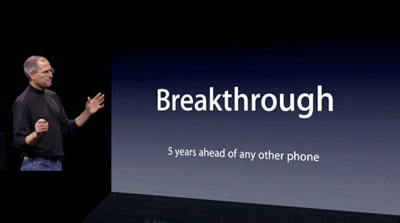5 years ahead
 Five years ago today, Apple CEO Steve Jobs unveiled the iPhone for the first time, completely changing the mobile industry. (If you haven’t watched his keynote lately, you should. It is his best performance ever, I think.)
Five years ago today, Apple CEO Steve Jobs unveiled the iPhone for the first time, completely changing the mobile industry. (If you haven’t watched his keynote lately, you should. It is his best performance ever, I think.)
That means today is a good time to check in on one of the things Jobs said near the beginning of his iPhone presentation: That the iPhone’s software — what made the iPhone the iPhone — was 5 years ahead of everyone.
For context, here’s exactly what Steve said:
“Now, software on mobile phones is like baby software. It’s not so powerful. And today, we’re going to show you a software breakthrough. Software that’s at least 5 years ahead of what’s on any other phone. Now, how do we do this? Well, we start with a strong foundation: iPhone runs OS X.” [Applause.]
So, was the iPhone really 5 years ahead of everyone? Have any of Apple’s competitors caught up to the original iPhone, let alone today’s?
Yes and no.
I’m not an engineer, so I can’t speak to the technical stuff under the glass. My guess is that there are some areas where Apple is still better, and many where Google has caught up.
But from a user’s perspective, it’s getting close.
Android is not as polished as iOS, and I’d argue that it’s still missing the elegance, simplicity, and beauty that have defined the iPhone’s software since its launch. These things are extremely important to a lot of people, and they’re why Apple has such a devoted base of repeat customers.
But from a practical perspective, for a while, you’ve been pretty much able to do whatever you want on an Android phone that you can do on an iPhone — and some things that you can only do on Android. Whether or not this is only possible because Google and its partners copied Apple isn’t really important here. Google’s execution has been excellent, and on the whole, the iPhone’s software isn’t (and hasn’t been) 5 years ahead of Android.
Sure, there are still some specific apps that are iPhone-only, and again, the iPhone is still a more pleasant experience. But it’s not like it was in 2007, when the iPhone made Palm, RIM, Nokia, and Microsoft look flat-out prehistoric. (Well, actually, none of those competitors has really caught up yet, and Palm is toast. But Google is kicking their butts.)
If anything, where Apple is the most ahead of Android today — perhaps even 5 years ahead — is on the business and customer experience sides.
Apple still seems to have the power in its relationships with carriers, demanding a clean user experience (no pre-installed crap), control over software updates and the length of its update path, a mostly-reliable App Store that makes a lot of money in app sales for developers, distribution through its own retail stores, tight integration with Macs and the iPad, and great devices at great prices. Not to mention an extremely profitable business model — selling tens of millions of iPhones per year for a big profit. These things seem to be more iffy in the Android camp.
What about the next 5 years? Many of the things that matter today will still matter: Hardware design, OS features and elegance, app stores, pricing, etc. But also things like cloud services, home and car integration, and mobile commerce platforms, which are in their infancy today. Those are some of the next races between Apple and Google worth watching.

Check out my new site: The New Consumer, a publication about how and why people spend their time and money.

